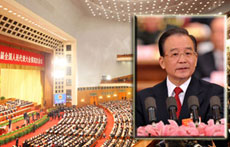A small detail reveals a key to better education
By Li Xing (China Daily)
Updated: 2011-03-08 08:54
Beijing - Numbers constitute an important part of Premier Wen Jiabao's government work report, but not because the Chinese are known for their math skills.
The largest figure is 55 trillion yuan ($8.4 trillion), the projected total GDP in 2015 (based on 2010 prices), or about $6,000 if calculated per capita.
But there are also small figures. One is Wen's pledge: "We will ensure that primary and middle school students do one hour of physical exercise in school every day."
It is the first time that China's premier has highlighted such a small detail in his work report to the annual session of the National People's Congress (NPC). However, it should not be surprising, as many people - from NPC deputies and members of the National Committee of the Chinese People's Political Consultative Conference (CPPCC) to netizens - point out that it concerns the well-being of nearly 100 million students.
Many micro-bloggers at sina.com.cn have shared their stories. One tells that his/her grade-one child has never had a physical exercise class.
A much-relayed micro blog quoted remarks from Mao Weitao, a well-known Shaoxing opera artist and an NPC deputy from Zhejiang province.
"My fourth-grade daughter was busy doing her homework when I asked her what suggestions she wanted me to take to this year's NPC session. Without raising her head, she said: 'Please tell Grandpa Wen, is there any way for us to do less homework,'" Mao said.
"I hope that the mandatory requirement will help lighten the students' workload."
However, this is more easily said than done. One public misconception is that it is more important to develop the brain than the brawn.
I posted a query on the micro blog at sina.com.cn asking whether it would be difficult to meet the pledge. One blogger answered: "It would be difficult to explain how schools would allow the children to play for an hour when they are burdened with the mission to enter a higher level of school."
Even students and their parents are not enthusiastic about exercise. A widely quoted study by Wu Jian, of China National Institute for Educational Research, which was released early last year, reveals that only 32 percent of teens surveyed chose outdoor exercise as the way to relieve their academic burden and that 74 percent of respondents said their parents never took them out for exercise.
Japanese researchers surveyed students in Japan, China and the United States about the time they devoted to physical exercise. The results indicated that only 8 percent of the Chinese students surveyed said they engaged in regular physical exercise after school, against 65.4 percent of the Japanese and 62.8 percent of the US students.
While applauding the premier's pledge, many people say schools should carry it out for the sake of the children's health.
Studies released in the past few years have shown that there has been an obvious decline in children's physical fitness. They are taller but heavier, with bigger waistlines. Nearly 60 percent of junior high students and 76 percent of senior high students are near-sighted.
However, instituting an hour of physical exercise in schools is not only about preventing the decline of children's health, but it should also be an effective way to help children develop sound minds as well.
Unfortunately, very little research has been done in China to link students' academic performance with physical exercise.
The most quoted international study is the book, The Revolutionary New Science of Exercise and the Brain, by psychiatrist and author John Ratey in collaboration with Eric Hagerman and published in 2008 by Little, Brown and Company.
Ratey points out that new studies show that "physical activity sparks biological changes that encourage brain cells to bind to one another. For the brain to learn, these connections must be made; they reflect the brain's fundamental ability to adapt to challenges.
"The more neuroscientists discover about this process, the clearer it becomes that exercise provides an unparalleled stimulus, creating an environment in which the brain is ready, willing, and able to learn," Ratey writes.
So, an hour of exercise in schools can start with running in the morning before classes begin. It not only helps develop a sound body, but also a sound mind.
China Daily
(China Daily 03/08/2011 page8)



